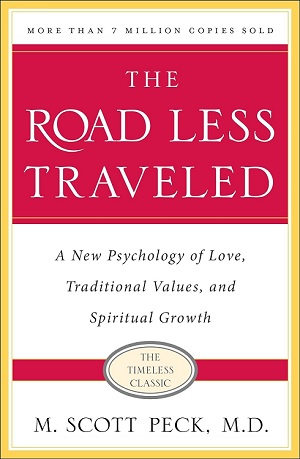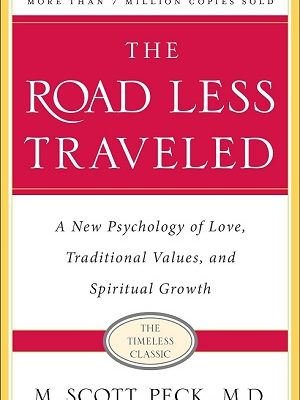M. Scott Peck’s The Road Less Traveled is a timeless classic that delves deep into the complexities of life, love, and spiritual growth. This book, first published in 1978, continues to resonate with readers for its profound insights into human psychology, relationships, and the journey toward personal and spiritual fulfillment. In the following extensive guide, we’ll explore the key lessons from the book.

Read: The Art of Non-Conformity
1. The Importance of Discipline
1. Life is Difficult
- Concept: Peck begins with the fundamental truth that life is inherently challenging. Accepting this reality is the first step toward dealing with life’s difficulties effectively.
- Application: Embrace the challenges of life as opportunities for growth. Rather than avoiding difficulties, confront them head-on, understanding that they are part of the journey toward personal development.
- Example: If you’re facing a challenging situation at work, instead of avoiding it or complaining, tackle the issue directly and view it as a chance to improve your skills or resolve conflicts.
2. Delayed Gratification
- Concept: Delayed gratification is the ability to postpone immediate pleasure for long-term rewards. It’s a key aspect of discipline that helps individuals achieve their goals.
- Application: Practice patience and self-control by prioritizing long-term success over short-term pleasures. Make decisions that align with your long-term goals, even if they require sacrifice in the present.
- Example: Saving money for future financial security instead of spending it on immediate luxuries is a practice of delayed gratification that can lead to greater stability and freedom in the future.
3. Acceptance of Responsibility
- Concept: Personal responsibility is crucial for mental and spiritual growth. Peck emphasizes that taking responsibility for our actions and decisions is essential for leading a fulfilling life.
- Application: Acknowledge your role in the circumstances of your life, both positive and negative. By accepting responsibility, you empower yourself to make changes and improve your situation.
- Example: If a relationship is struggling, instead of blaming the other person, consider how your actions and behaviors may have contributed to the issues. Take responsibility for your part and work on making amends.
4. Dedication to Truth
- Concept: Peck stresses the importance of being truthful with oneself and others. Honesty is a cornerstone of discipline and personal integrity.
- Application: Strive to be honest in all aspects of your life. This includes acknowledging uncomfortable truths about yourself and facing difficult realities in your relationships and work.
- Example: If you’re unhappy in your job, instead of ignoring the problem, be honest with yourself about why you feel this way and explore options for making a change.
5. Balancing
- Concept: Balancing is the act of juggling multiple aspects of life while maintaining a sense of equilibrium. This requires flexibility, adaptability, and a willingness to compromise.
- Application: Learn to balance different priorities in your life, such as work, family, personal time, and spiritual growth. Understand that achieving balance requires ongoing adjustment and self-awareness.
- Example: If you’re spending too much time at work and neglecting your family, take steps to reallocate your time and energy to ensure that both areas of your life receive the attention they need.
Lesson: Discipline is the foundation of a fulfilling life. By embracing life’s difficulties, practicing delayed gratification, accepting responsibility, being truthful, and balancing priorities, you can achieve personal growth and success.
2. The Nature of Love
1. Love is an Act of Will
- Concept: Peck challenges the common misconception that love is purely a feeling. Instead, he argues that love is an act of will, a choice to extend oneself for the purpose of nurturing one’s own or another’s spiritual growth.
- Application: Understand that love requires effort, commitment, and conscious decision-making. Love is not passive; it involves active participation in the well-being of others and oneself.
- Example: In a marriage, love is not just about feeling affection; it’s about making daily choices to support, care for, and grow with your partner, even during difficult times.
2. The Importance of Self-Love
- Concept: Peck emphasizes that self-love is not selfish but a necessary component of true love. To love others fully, one must first love and care for oneself.
- Application: Cultivate self-respect and self-care as part of your love for others. By maintaining your own well-being, you become more capable of loving others effectively.
- Example: Setting boundaries to protect your mental and emotional health is an act of self-love that allows you to engage more positively in relationships with others.
3. Love and Spiritual Growth
- Concept: Love is closely linked to spiritual growth. True love aims to help others grow spiritually and to grow oneself. It is not about possession or control but about mutual development.
- Application: Foster relationships that encourage spiritual growth and development. Love should be a force that drives both you and those you love toward higher levels of understanding and fulfillment.
- Example: Encouraging a friend or partner to pursue their dreams and supporting their personal growth, even if it requires sacrifices, is an expression of true love.
Lesson: Love is more than just a feeling; it’s a conscious choice and an act of will that promotes spiritual growth. By understanding and practicing self-love, and by committing to the growth of others, you can cultivate deeper and more meaningful relationships.
3. Growth and Religion
1. The Role of Religion in Spiritual Growth
- Concept: Peck explores the idea that religion, in its many forms, can be a valuable tool for spiritual growth. However, he distinguishes between genuine spirituality and religious dogma, cautioning against the latter.
- Application: Use religion as a means to explore and deepen your spiritual life, but remain wary of rigid dogmas that can stifle growth. Seek a personal connection with the divine that transcends institutional boundaries.
- Example: Engaging in personal practices like meditation or prayer, regardless of religious affiliation, can help you connect with your spirituality in a way that feels authentic to you.
2. The Concept of Grace
- Concept: Peck introduces the concept of grace, which he describes as a mysterious force that operates in the universe, aiding our spiritual development in ways we may not fully understand.
- Application: Be open to the idea that there are forces beyond your control that contribute to your growth and well-being. Recognize moments of grace in your life and be grateful for them.
- Example: When you experience an unexpected blessing or a sudden insight that leads to personal growth, consider it an instance of grace at work in your life.
3. Embracing Mystery
- Concept: Spiritual growth often involves embracing the mystery of life. Peck suggests that not all questions have clear answers, and part of spiritual maturity is accepting the unknown.
- Application: Cultivate a sense of curiosity and openness to the mysteries of life. Instead of seeking certainty in all things, learn to find peace in the unknown and trust in the journey.
- Example: When faced with a life challenge that doesn’t have a clear solution, instead of becoming anxious, embrace the uncertainty and trust that you will find your way forward in time.
Lesson: Religion and spirituality play crucial roles in personal growth. By distinguishing between dogma and genuine spirituality, embracing the concept of grace, and accepting the mysteries of life, you can deepen your spiritual journey and find greater meaning.
4. The Journey of Spiritual Growth
1. The Four Stages of Spiritual Development
- Concept: Peck outlines four stages of spiritual development: chaotic/antisocial, formal/institutional, skeptic/individual, and mystic/communal. Each stage represents a different level of spiritual maturity.
- Application: Recognize where you are in your spiritual journey and strive to progress through the stages. Understand that growth is a lifelong process and that each stage offers its own lessons.
- Example: If you’re in the skeptic/individual stage, you may be questioning traditional beliefs and seeking your own path. Use this time to explore different philosophies and deepen your understanding.
2. The Role of Suffering in Growth
- Concept: Peck argues that suffering is an inevitable part of the spiritual journey. It’s through suffering that we grow, learn, and become more compassionate and wise.
- Application: Instead of avoiding or denying suffering, see it as an opportunity for growth. Use difficult experiences to build resilience and deepen your spiritual understanding.
- Example: If you’re going through a painful breakup, instead of suppressing your emotions, reflect on what the experience is teaching you about love, loss, and personal growth.
3. The Importance of Openness
- Concept: Openness to new experiences, ideas, and perspectives is crucial for spiritual growth. Peck emphasizes that rigid thinking and resistance to change hinder our development.
- Application: Cultivate an open mind and heart. Be willing to explore new ideas, challenge your beliefs, and adapt to change. This openness will allow you to grow spiritually and intellectually.
- Example: If you encounter a belief system that differs from your own, instead of dismissing it outright, take the time to understand it and consider what value it might offer.
Lesson: Spiritual growth is a journey that involves progressing through stages of development, embracing suffering as a teacher, and maintaining openness to new experiences. By understanding and embracing these aspects of growth, you can evolve into a more mature and spiritually aware individual.
Conclusion
The Road Less Traveled by M. Scott Peck offers profound insights into the nature of discipline, love, spirituality, and personal growth. The lessons from this book emphasize the importance of taking responsibility for one’s life, practicing self-love and love for others, engaging in spiritual growth, and embracing the challenges and mysteries of life.
This book is not just a guide but a lifelong companion for those seeking to lead a more meaningful and fulfilling life. By applying these lessons, you can embark on a journey of personal and spiritual development that will transform the way you live, love, and grow (Amazon).



